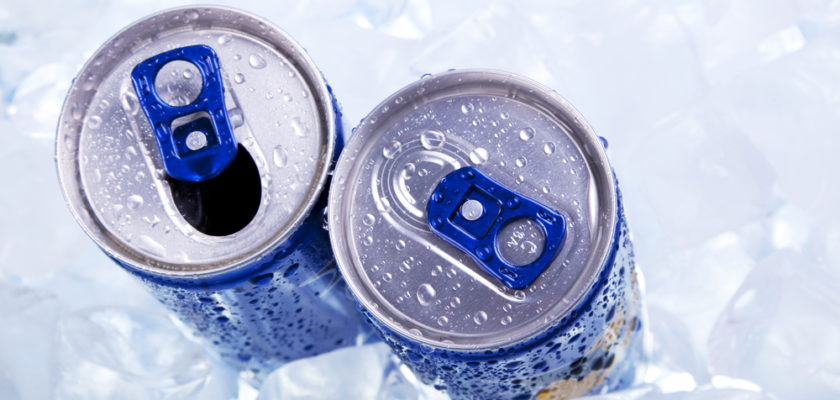Energy drinks are becoming a new trend when it comes to pre-workouts and energy-boosting during intense training sessions. Not only that, but you can also gulp down an energy drink can if you want to skim actively through your afternoon meetings or late classes with a productive spirit. Whatever you use them for, make sure to do it moderately as no matter how beneficial they are, it’s important to know your limits and avoid being dependent on them.
The problem is, there are a lot of myths that surround energy drinks, with some studies presenting them as the monster that sends youngsters to the grave, and others stating the different side effects that they may have on some populations such as children and sedentary people.
While the side effects do exist, it’s important to keep in mind that they are related to unregulated, sporadic consumption. Should you drink your energy beverage in the right context, you’re bound to get a plethora of benefits for your athletic performance, including the ones we’re going to talk about in this article.
1. They Provide a Decent Carb Intake
There is no sense denying it; sugar is an essential ingredient of any energy drink. Now, while that may seem scary and dangerous for a sedentary individual, it can actually be highly beneficial for an athlete. It’s a well-known fact that physical performance requires energy, which comes from calories, something that the carbs in energy drinks can provide.
Not only are carbs included in decent amounts in every can, which is around 18 to 25 grams per 8 ounces, but they’re fast-digesting ones, meaning that your body doesn’t need to spend hours metabolizing the different molecules to get glucose to your cells. In other words, besides being a great source of energy, energy drinks are also a fast one that increases endurance, performance, and recovery.
2. It’s All About the Caffeine Kick
Caffeine is yet another primary ingredient of energy drinks. When you chug a can of sugar free Red Bull, for example, you get a powerful performance boost thanks to the caffeine that you’re consuming.
Caffeine works by binding the sleep-inducing adenosine in your brain cells. Once that happens, the brain signals a fight or flight state throughout the body, which leads to an increase in blood pressure and norepinephrine.
Is it safe to consume caffeine from energy drinks, though?
According to Jennifer McDaniel, a spokeswoman for the Academy of Nutrition and Dietetics, the average energy drink contains around 80 mg of caffeine per 8.5 ounces or 250 milliliters, which means that you’re getting about 160 mg of this molecule per 16-ounce can.
You may be thinking “isn’t that a lot?”. It’s entirely natural to be worried when it comes to what you’re consuming, but you shouldn’t panic as the recommended safe daily intake of caffeine is between 300 and 400 milligrams, which makes energy drinks a safe choice when it comes to the jolt molecule.
So, next time you need a performance boost, just chug a can of Monster Energy Drink and wait for the caffeine to kick in. Your workouts will never be the same.
3. Electrolytes are Your Friend
During exercise, one loses both water and electrolytes as he/she sweats, which may lead to dehydration and a decreased performance, something that no athlete would carve. According to The Dietitians of Canada, you should look for an energy drink that contains 460 to 690 mg of sodium per liter.
Also, note that the specified concentrations are recommended for short sports events. Long events may require higher levels, so make sure to consult your dietitian to determine your specific dosage if you’re getting prepared and training for one.
4. Carbs? More like Simple Sugars
When you’re about to enter an athletic competition, it’s crucial to get a sufficient amount of carbs without getting any gastrointestinal stress, something that’s caused by fiber consumption, which is practically inevitable when eating a full meal. Thankfully, energy drinks mainly contain simple sugars, which can be easily digested without wreaking havoc on your digestive system and your body.
5. A Multitude of Flavors
Unlike other sources of energy, energy drinks come at different flavors, giving you the chance to choose something that suits your tongue and stomach. Some of us cannot start their day without their cup of morning jolt, but others cannot stand the taste of coffee or tea, which makes the flavors in energy drinks a real advantage over other beverages.
Take Monster, for example. Check the different flavors offered by the world-famous energy drink brand:
Table could not be displayed.6. Energy Drinks are Refreshing
Sipping a hot cup of coffee isn’t everyone’s cup of tea (pun intended), which raises the need for a jolt beverage that can refresh your throat and boost your energy even during the hottest of days. That’s where energy drinks come in to save your day.
7. Energy Drinks Provide Other Nutritional Values
Besides caffeine, carbs, and simple sugars, energy drinks actually contain several other ingredients that can be greatly beneficial for your body. We’re talking about molecules such as taurine, an antioxidant amino acid that’s known to regulate muscle contraction and neurotransmitters within the brain, glucuronolactone, a substance that intervenes in the structuring of connective tissues, and ginseng, a plant-extract that can boost energy and reduce blood pressure and cholesterol levels.
So, not only can energy drinks help for providing the pump during your workouts or training sessions, but they can actually give you several health benefits that you wouldn’t get otherwise.
Final Thoughts
Unlike what most people believe, energy drinks have a plethora of advantages that give them the edge over other energy-inducing foods. Want to get your athletic performance and productivity to the next level? Grab a can of your favorite energy drink!

